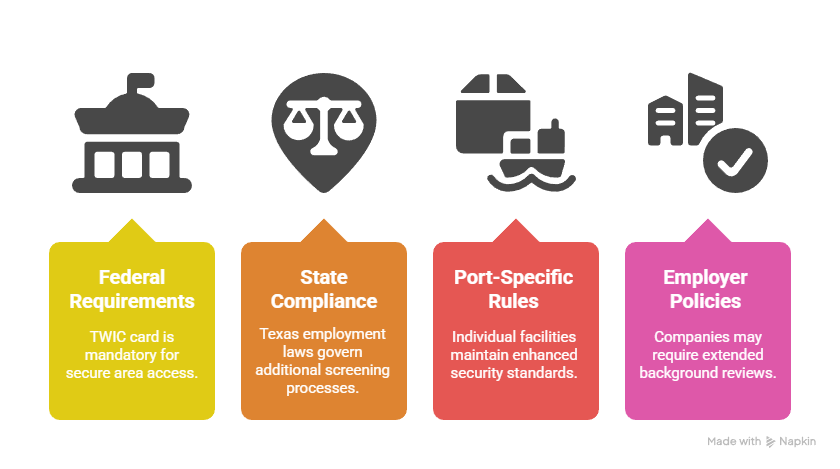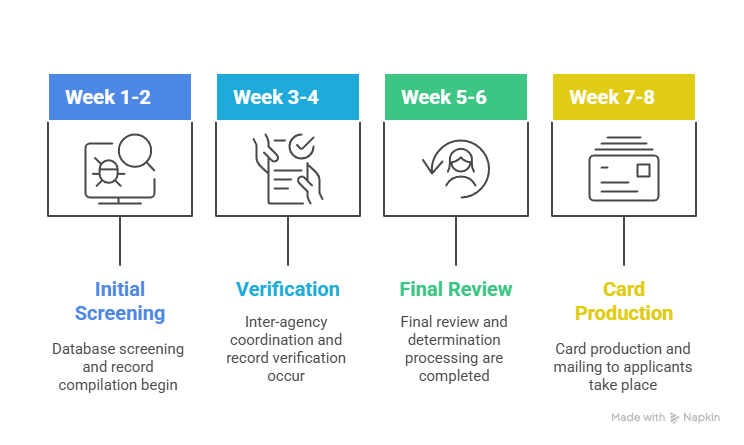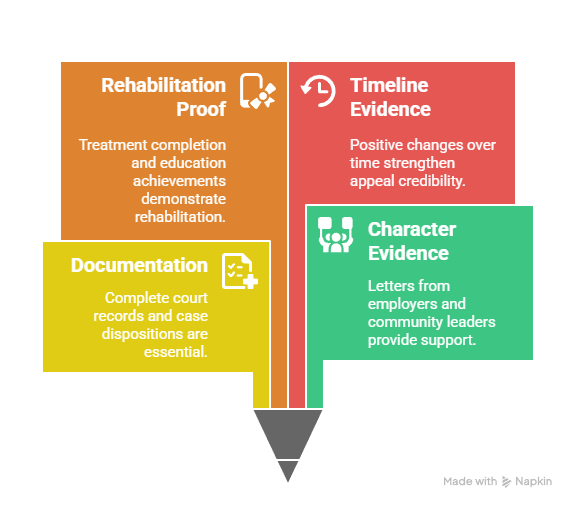Port worker background screening in Texas requires federal TWIC card approval and employer-specific checks that examine criminal history, immigration status, and security clearances. These comprehensive screenings protect maritime facilities while ensuring qualified workers can access employment opportunities in Texas's major ports.
Key Takeaways
- All Texas port workers need TWIC cards and must pass federal background screenings before accessing secure maritime facilities
- The screening process takes 6-8 weeks and costs between $125-$300 depending on employer requirements and additional certifications
- Criminal history reviews examine 5-7 year lookback periods with permanent disqualifiers including terrorism and espionage charges
- Major Texas ports in Houston, Galveston, and Beaumont maintain additional screening standards beyond federal minimums
- Appeals processes exist for denied applications through TSA's Waiver Review Division within 60 days of unfavorable decisions
- Employers must follow FCRA compliance rules when conducting supplementary background investigations beyond TWIC requirements
Understanding Port Worker Background Screening in Texas
Port worker background screening in Texas operates under strict federal and state regulations. Furthermore, the Transportation Security Administration oversees maritime security through the TWIC program. Additionally, Texas ports handle millions of tons of cargo annually, making thorough screening essential for national security.
The screening process combines federal requirements with employer-specific standards. Subsequently, workers must pass multiple background checks before accessing port facilities. These checks examine criminal records, immigration status, and terrorism databases.
Texas maritime jobs screening involves several key components. First, criminal history checks review court records and arrest databases. Meanwhile, immigration verification confirms legal work status.

- Federal Requirements: TWIC card mandatory for all secure area access
- State Compliance: Texas employment laws govern additional screening
- Port-Specific Rules: Individual facilities maintain enhanced standards
- Employer Policies: Companies may require extended background reviews
The regulatory framework combines multiple federal agencies. Specifically, TSA administers TWIC programs and security clearances. Similarly, FBI conducts criminal background investigations. These agencies coordinate to ensure comprehensive screening coverage.
Federal TWIC Card Requirements
The Transportation Worker Identification Credential serves as the primary maritime security clearance Texas workers need. Consequently, TSA issues TWIC cards after comprehensive background investigations. The credential allows unescorted access to secure port areas nationwide.
TWIC applications require biometric data collection and document verification. During this process, applicants submit fingerprints and photographs at enrollment centers. Background investigations then examine multiple federal databases for disqualifying information.
Criminal History Evaluation Standards
Criminal background checks for port workers examine extensive record databases. Initially, the screening process reviews state and federal court records. Additionally, arrest information undergoes evaluation even without convictions. Correctional facility records also provide additional verification data.
Permanent disqualifying offenses result in automatic TWIC denial. These crimes include espionage, treason, and terrorism-related charges. Furthermore, immigration document fraud carries permanent consequences.
Interim disqualifying crimes have specific lookback periods for evaluation. For example, controlled substance violations carry five-year restrictions from conviction completion. Similarly, dishonesty offenses including fraud and bribery have seven-year lookback periods.
| Offense Category | Lookback Period | Appeal Options |
| Permanent Disqualifiers | Lifetime ban | Limited waiver availability |
| Terrorism-Related | Lifetime ban | No appeals accepted |
| Dishonesty/Fraud | 7 years | Rehabilitation evidence required |
| Drug Violations | 5 years | Treatment completion helpful |
Immigration violations receive careful scrutiny during background reviews. Notably, deportation orders prevent TWIC approval until resolved. Additionally, document fraud carries serious consequences for maritime security clearance Texas applications.
The evaluation process considers rehabilitation evidence and behavior changes. Character references from employers and community leaders strengthen applications. Moreover, educational achievements show personal growth and development.
TWIC Card Application Process and Timeline
The TWIC application process begins with online pre-enrollment through TSA's system. Next, applicants complete personal information and answer background questions. Fortunately, enrollment centers operate throughout Texas for convenient access.
Enrollment appointments typically last 30-45 minutes for completion. During appointments, fingerprint collection uses electronic scanning technology for accuracy. Subsequently, document verification confirms identity and legal status.
Background investigation processing takes 6-8 weeks under normal circumstances. However, complex cases with extensive criminal history may require additional time. Additionally, immigration status verification can delay processing significantly.

Applicants receive status updates through the online TWIC system. Throughout the process, email notifications provide processing milestone information. Finally, standard mail delivery takes 7-10 business days.
Employers often conduct parallel background screening during TWIC processing. This concurrent approach reduces overall hiring timelines significantly. Additionally, company-specific requirements may include employment verification and reference checks.
Required Documentation
TWIC applications require specific documentation types for identity and status verification. Primary identification includes valid driver's licenses or state identification cards. Alternatively, U.S. passports serve as both identity and citizenship proof.
Citizenship verification requires birth certificates issued by vital records offices. Similarly, naturalization certificates prove citizenship for naturalized Americans. However, non-citizens must provide immigration documents showing legal status.
Employer-Specific Background Screening Requirements
Port employers implement additional screening measures beyond federal TWIC requirements. These enhanced protocols address company-specific security needs and insurance requirements. Typically, employment verification covers 7-10 years of work history.
Maritime security clearance Texas employers often require varies by job function. For instance, longshoremen face standard screening requirements with basic criminal history review. In contrast, crane operators undergo enhanced safety record verification. Meanwhile, security personnel require law enforcement background checks.
Screening intensity increases with job responsibility levels and facility access requirements. Supervisory positions require management experience verification and leadership references. Additionally, hazardous materials handlers need specialized safety training confirmation.
- Entry-Level Positions: Basic TWIC plus employment verification
- Equipment Operators: Safety records and certification validation
- Supervisory Roles: Leadership experience and management references
- Security Personnel: Law enforcement background preferred
Texas maritime jobs screening must comply with Equal Employment Opportunity Commission guidelines. Therefore, employers cannot discriminate based on protected characteristics during screening. Furthermore, criminal history evaluation must consider job-relatedness and business necessity.
Company policies often exceed federal minimum requirements for thoroughness. For example, extended criminal history reviews may examine 10-year periods. Additionally, credit checks may be required for financial responsibility positions.
Costs and Financial Considerations
Port worker background screening costs vary based on multiple factors and requirements. The basic TWIC card application fee is $125.25 for new applicants. In comparison, renewal applications cost $60.00 for existing cardholders.
Employer background screening adds $50-$150 to total costs depending on scope. Basic employment verification costs less than comprehensive criminal history reviews. Additionally, drug testing typically costs $40-$80 per screening.
| Cost Component | Price Range | Typical Payer |
| TWIC Application | $125.25 | Employee |
| TWIC Renewal | $60.00 | Employee |
| Employer Screening | $50-$150 | Varies |
| Drug Testing | $40-$80 | Usually employer |
Additional expenses may include training certifications and safety courses. For instance, basic safety training costs $200-$300 per person. Furthermore, travel expenses to enrollment centers add to total costs.
Some employers reimburse background screening expenses after successful employment. Typically, reimbursement occurs after probationary period completion. Additionally, workforce development programs sometimes provide financial assistance.
Appeals and Waiver Procedures
Applicants receiving unfavorable TWIC determinations can request appeals through established procedures. The TSA Waiver Review Division handles all appeal requests. However, applications must be submitted within 60 days of receiving denial notifications.
The appeal process requires comprehensive documentation and evidence submission. Court records must be complete and certified. Moreover, character references should come from credible sources.
Common appeal grounds include factual errors in background determinations. For instance, identity theft situations may result in incorrect criminal records. Additionally, expunged or sealed records sometimes appear inappropriately.

- Documentation Requirements: Complete court records and case dispositions
- Character Evidence: Letters from employers, community leaders, clergy
- Rehabilitation Proof: Treatment completion, education achievements, stable employment
- Timeline Evidence: Demonstration of positive changes over time
Success rates for appeals vary significantly based on circumstances and evidence quality. Permanent disqualifying offenses rarely receive favorable determinations. However, interim disqualifying crimes show higher success rates with strong rehabilitation evidence.
The review process typically requires 4-6 weeks for completion. Nevertheless, complex cases may take longer for thorough evaluation. Legal consultations may help prepare stronger appeals.
Major Texas Port Facilities and Their Requirements
Texas operates several major port facilities with distinct screening requirements beyond federal standards. The Port of Houston ranks among the largest petrochemical ports nationally. Consequently, enhanced screening focuses on hazardous materials handling and safety protocols.
The Port of Galveston emphasizes cruise ship operations and passenger services. Therefore, customer service background screening receives priority attention. Additionally, international travel experience provides advantages for passenger terminal positions.
Port of Beaumont focuses on military cargo and energy sector operations. As a result, enhanced security clearances may be required for defense-related cargo. Furthermore, energy industry experience receives preference during screening.
- Houston: Petrochemical focus, hazmat certifications, safety emphasis
- Galveston: Cruise operations, customer service, language skills
- Beaumont: Military cargo, energy sector, enhanced security
- Texas City: Chemical processing, specialized safety training
Each facility maintains relationships with specific training providers and educational institutions. Local community colleges offer maritime training programs. Therefore, understanding facility-specific preferences helps job seekers prepare effectively.
Port-specific security requirements reflect cargo types and operational needs. Container terminals emphasize cargo security and logistics efficiency. Meanwhile, bulk commodity facilities focus on safety and environmental compliance.
Timeline Management and Planning
Effective planning helps manage port worker background screening timelines efficiently. Early TWIC application submission prevents employment delays. Similarly, concurrent employer screening reduces overall processing time.
Pre-employment planning should account for potential complications. Criminal history issues may extend processing timelines significantly. Additionally, immigration status questions can cause delays.
Employers often provide timeline guidance for new hire processing. Standard processing assumes 8-10 weeks from application to employment start. However, complex cases may require 12-16 weeks for complete processing.
- Months 1-2: TWIC application and initial employer screening
- Month 3: Background processing and verification completion
- Month 4: Final approvals and training program enrollment
Seasonal employment patterns affect screening timelines at Texas ports. Summer months often have higher application volumes. Additionally, hurricane season can disrupt enrollment center operations.
Communication with employers helps manage expectations throughout the process. Regular status updates prevent misunderstandings. Furthermore, proactive communication demonstrates professionalism and commitment.
Renewal Planning
TWIC card renewal planning should begin 4-6 months before expiration. Renewal applications have shorter processing times than initial applications. Therefore, employment continuity requires timely renewal completion.
Employer notification about renewal timelines helps with scheduling. Some companies provide renewal reminders to employees. Additionally, coordinated renewal timing prevents operational disruptions.
Compliance and Legal Considerations
Port worker background screening must comply with multiple federal and state regulations. Fair Credit Reporting Act requirements apply to employer-conducted screenings. Similarly, Equal Employment Opportunity Commission guidelines prevent discriminatory practices.
Texas employment law requires proper disclosure and authorization for background checks. Written consent must be obtained before screening begins. Additionally, adverse action procedures must be followed for unfavorable results.
FCRA compliance requires specific procedures for third-party background screening. Disclosure documents must be clear and conspicuous. Furthermore, authorization forms must be separate from other documents.
- Disclosure Requirements: Clear notification of background check intent
- Authorization: Written consent required before screening begins
- Adverse Action Process: Proper procedures for unfavorable results
- Dispute Rights: Opportunity to challenge incorrect information
Discrimination prevention requires careful screening policy development. Job-relatedness must be established for all screening criteria. Furthermore, business necessity justifies screening requirements. Consistent application ensures fair treatment of all applicants.
Record retention requirements vary by jurisdiction and screening type. Employment records must be maintained for specified periods. Additionally, privacy protection prevents unauthorized access.
Training and Certification Requirements
Port worker positions often require specialized training and certifications beyond basic background screening. Maritime safety training is mandatory for most port operations. Additionally, OSHA compliance training covers workplace safety requirements.
Basic maritime safety training typically takes 40 hours to complete. Course content covers personal protective equipment usage. Moreover, emergency response procedures receive emphasis.
Specialized certifications vary by job function and equipment types. Crane operators need certification from accredited training programs. Similarly, forklift operators require safety certification and periodic retraining.
| Training Type | Duration | Renewal Period | Cost Range |
| Basic Maritime Safety | 40 hours | 5 years | $300-$500 |
| Crane Operation | 80-120 hours | 3 years | $2000-$4000 |
| Hazmat Certification | 24 hours | 3 years | $200-$400 |
| First Aid/CPR | 8 hours | 2 years | $100-$200 |
Training timing often coordinates with background screening completion. Some employers provide training during screening processing. Additionally, community college partnerships offer convenient training options.
Certification maintenance requires ongoing education and periodic renewal. Continuing education units maintain current certifications. Furthermore, professional development opportunities advance career prospects.
Conclusion
Port worker background screening in Texas involves comprehensive federal and employer-specific requirements that protect maritime security while providing employment opportunities. The process requires TWIC card approval, criminal history evaluation, and compliance with multiple regulations. Understanding timeline requirements, cost factors, and facility-specific standards helps applicants navigate the system successfully. With proper preparation and documentation, qualified workers can access rewarding careers in Texas's vital maritime industry.
Frequently Asked Questions
How long does port worker background screening take in Texas?
Port worker background screening typically takes 6-8 weeks to complete, including TWIC card processing and employer verification. The federal TWIC application requires 6-8 weeks for standard processing, while employer-specific screening adds 1-2 weeks. Complex cases with criminal history or immigration issues may extend timelines to 10-12 weeks total.
What are the TWIC card requirements for Texas port workers?
TWIC card requirements include passing comprehensive background checks, providing identity and citizenship documentation, and paying $125.25 in fees. Applicants must visit enrollment centers for biometric data collection including fingerprints and photographs. The card remains valid for five years and allows unescorted access to secure maritime facilities.
Which crimes disqualify workers from Texas port employment?
Permanent disqualifying crimes include espionage, treason, terrorism-related offenses, and transportation security violations. Interim disqualifying offenses include drug violations (5-year lookback), dishonesty crimes like fraud (7-year lookback), and weapons charges (5-year lookback). Mental incompetency determinations and outstanding warrants also prevent approval.
How much does port employment screening cost in Texas?
Port employment screening costs range from $125-$300 total, including TWIC application fees ($125.25), employer background checks ($50-$150), drug testing ($40-$80), and potential medical examinations ($100-$200). Some employers reimburse screening expenses after successful completion of probationary employment periods.
Can I appeal a denied TWIC card application?
Yes, applicants can appeal denied TWIC applications through TSA's Waiver Review Division within 60 days of receiving unfavorable determinations. Appeals require comprehensive documentation including court records, character references, and rehabilitation evidence. The review process typically takes 4-6 weeks to complete.
Do different Texas ports have varying screening requirements?
Yes, individual Texas ports maintain additional requirements beyond federal TWIC standards. The Port of Houston emphasizes petrochemical safety and hazmat certifications. The Port of Galveston focuses on customer service backgrounds for cruise operations. Each facility may require specialized training and enhanced security clearances.
What documents do I need for port worker background screening?
Required documents include government-issued photo identification (driver's license or state ID), citizenship or immigration status proof (birth certificate, passport, or naturalization papers), and any relevant court records. Non-U.S. citizens must provide current work authorization documentation and legal status verification.
How often must port workers renew their background screening?
TWIC cards require renewal every five years with updated background screening. Some employers conduct periodic re-screening at shorter intervals, typically every 2-3 years. Certain positions may require annual screening updates. Renewal applications cost $60.00 and have shorter processing times than initial applications.
Additional Resources
- Massachusetts Fair Chance Act - Full Text
https://www.mass.gov/info-details/fair-chance-act - Attorney General's Fair Chance Hiring Guidance
https://www.mass.gov/service-details/fair-chance-hiring-guidance - Fair Credit Reporting Act - Compliance for Employment Screening
https://www.ftc.gov/tips-advice/business-center/guidance/using-consumer-reports-what-employers-need-know - National Employment Law Project - Ban the Box Resources
https://www.nelp.org/campaign/ensuring-fair-chance-to-work/ - Massachusetts Workforce Development Resources
https://www.mass.gov/orgs/massachusetts-workforce-development - Criminal Justice Policy Coalition - Employment Resources
https://www.cjpc.org/employment-resources - Legal Aid Society - Employment Rights Information
https://www.legalaidma.org/employment-rights
